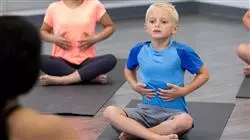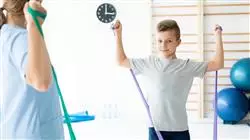University certificate
Scientific endorser

The world's largest faculty of physiotherapy”
Introduction to the Program
Understand learning in a holistic way to ensure the motor development of your child patients"

Since the development of neuroeducation a few years ago, it has been consolidated as a discipline that studies the interaction of the environment in the learning process of the brain. In this way, it has become a new educational approach that encompasses different fields of knowledge. For physical therapists, it helps them learn about the importance of the external environment with motor development and mental health.
For all these reasons, the program was created around Physical Neuroeducation and Learning. This helps professionals to implement strategies for disease prevention and quality of life improvement in terms of cardiovascular and other risk diseases.
All the content is available in a 100% online Postgraduate certificate that gives students the ease of being able to study it comfortably, wherever and whenever they want. Students will only need a device with internet access to take their career one step further. A modality according to the current times with all the guarantees to position professionals in a highly demanded sector.
Understand holistic learning and ensure the motor and emotional development of the children in your care"
This Postgraduate certificate in Physical Neuroeducation and Learning contains the most complete and up-to-date educational program on the market. Its most notable features are:
- Practical cases presented by experts in Neuroeducation
- The graphic, schematic, and practical contents with which they are created, provide scientific and practical information on the disciplines that are essential for professional practice
- Practical exercises where self-assessment can be used to improve learning
- Its special emphasis on innovative methodologies
- Theoretical lessons, questions to the expert, debate forums on controversial topics, and individual reflection assignments
- Content that is accessible from any fixed or portable device with an Internet connection
Stay at the forefront of your profession and acquire the knowledge that will help you position yourself as an expert in child development"
The program’s teaching staff includes professionals from the sector who contribute their work experience to this educational program, as well as renowned specialists from leading societies and prestigious universities.
Its multimedia content, developed with the latest educational technology, will allow professionals to learn in a contextual and situated learning environment, i.e., a simulated environment that will provide immersive education programmed to prepare in real situations.
The design of this program focuses on Problem-Based Learning, by means of which professionals must try to solve the different professional practice situations that are presented to them throughout the academic year. For this purpose, the student will be assisted by an innovative interactive video system created by renowned and experienced experts.
This Postgraduate certificate has the best educational material based on the latest scientific developments on the subject"

Understand the importance of physical activity in children's development and learning"
Why study at TECH?
TECH is the world’s largest online university. With an impressive catalog of more than 14,000 university programs available in 11 languages, it is positioned as a leader in employability, with a 99% job placement rate. In addition, it relies on an enormous faculty of more than 6,000 professors of the highest international renown.

Study at the world's largest online university and guarantee your professional success. The future starts at TECH”
The world’s best online university according to FORBES
The prestigious Forbes magazine, specialized in business and finance, has highlighted TECH as “the world's best online university” This is what they have recently stated in an article in their digital edition in which they echo the success story of this institution, “thanks to the academic offer it provides, the selection of its teaching staff, and an innovative learning method aimed at educating the professionals of the future”
A revolutionary study method, a cutting-edge faculty and a practical focus: the key to TECH's success.
The most complete study plans on the university scene
TECH offers the most complete study plans on the university scene, with syllabuses that cover fundamental concepts and, at the same time, the main scientific advances in their specific scientific areas. In addition, these programs are continuously being updated to guarantee students the academic vanguard and the most in-demand professional skills. In this way, the university's qualifications provide its graduates with a significant advantage to propel their careers to success.
TECH offers the most comprehensive and intensive study plans on the current university scene.
A world-class teaching staff
TECH's teaching staff is made up of more than 6,000 professors with the highest international recognition. Professors, researchers and top executives of multinational companies, including Isaiah Covington, performance coach of the Boston Celtics; Magda Romanska, principal investigator at Harvard MetaLAB; Ignacio Wistumba, chairman of the department of translational molecular pathology at MD Anderson Cancer Center; and D.W. Pine, creative director of TIME magazine, among others.
Internationally renowned experts, specialized in different branches of Health, Technology, Communication and Business, form part of the TECH faculty.
A unique learning method
TECH is the first university to use Relearning in all its programs. It is the best online learning methodology, accredited with international teaching quality certifications, provided by prestigious educational agencies. In addition, this disruptive educational model is complemented with the “Case Method”, thereby setting up a unique online teaching strategy. Innovative teaching resources are also implemented, including detailed videos, infographics and interactive summaries.
TECH combines Relearning and the Case Method in all its university programs to guarantee excellent theoretical and practical learning, studying whenever and wherever you want.
The world's largest online university
TECH is the world’s largest online university. We are the largest educational institution, with the best and widest online educational catalog, one hundred percent online and covering the vast majority of areas of knowledge. We offer a large selection of our own degrees and accredited online undergraduate and postgraduate degrees. In total, more than 14,000 university degrees, in eleven different languages, make us the largest educational largest in the world.
TECH has the world's most extensive catalog of academic and official programs, available in more than 11 languages.
Google Premier Partner
The American technology giant has awarded TECH the Google Google Premier Partner badge. This award, which is only available to 3% of the world's companies, highlights the efficient, flexible and tailored experience that this university provides to students. The recognition as a Google Premier Partner not only accredits the maximum rigor, performance and investment in TECH's digital infrastructures, but also places this university as one of the world's leading technology companies.
Google has positioned TECH in the top 3% of the world's most important technology companies by awarding it its Google Premier Partner badge.
The official online university of the NBA
TECH is the official online university of the NBA. Thanks to our agreement with the biggest league in basketball, we offer our students exclusive university programs, as well as a wide variety of educational resources focused on the business of the league and other areas of the sports industry. Each program is made up of a uniquely designed syllabus and features exceptional guest hosts: professionals with a distinguished sports background who will offer their expertise on the most relevant topics.
TECH has been selected by the NBA, the world's top basketball league, as its official online university.
The top-rated university by its students
Students have positioned TECH as the world's top-rated university on the main review websites, with a highest rating of 4.9 out of 5, obtained from more than 1,000 reviews. These results consolidate TECH as the benchmark university institution at an international level, reflecting the excellence and positive impact of its educational model.” reflecting the excellence and positive impact of its educational model.”
TECH is the world’s top-rated university by its students.
Leaders in employability
TECH has managed to become the leading university in employability. 99% of its students obtain jobs in the academic field they have studied, within one year of completing any of the university's programs. A similar number achieve immediate career enhancement. All this thanks to a study methodology that bases its effectiveness on the acquisition of practical skills, which are absolutely necessary for professional development.
99% of TECH graduates find a job within a year of completing their studies.
Postgraduate Certificate in Physical Neuroeducation and Learning
Neuroeducation is a discipline that combines knowledge from neuroscience, psychology and education to develop teaching and learning models that adapt to the individual abilities and needs of the brain. Physical neuroeducation, on the other hand, focuses on the study of how physical activity and exercise affect the brain and learning.
Physical neuroeducation and learning are related to the extent to which physical activity and exercise influence the brain and thus the ability to learn. Studies show that physical exercise can increase the production of chemicals in the brain that improve attention, cognitive control, memory and learning. In addition, physical activity in education has been shown to improve concentration, self-esteem, mood and problem-solving skills.
Physical neuroeducation can also help identify and address learning difficulties and neurological disorders, taking advantage of the neuroadaptations generated during physical activity to improve cognitive ability.
Physical neuroeducation and learning strengthen their relationship through the study of how physical activity and exercise influence the brain and thus the ability to learn. By better understanding how the brain works, education can be tailored to ensure more effective and satisfying learning for all.
This academic program focuses on providing a solid and comprehensive training in the relationship between neuroscience, physical education and learning. Students will learn about the cognitive processes involved in movement and learning, and how physical exercise can improve academic performance. In addition, they will be taught how to design, implement and evaluate effective educational interventions based on physical neuroeducation. At the end of the program, students will be trained to effectively address the use of neuroscience in physical education and the impact on student learning.







